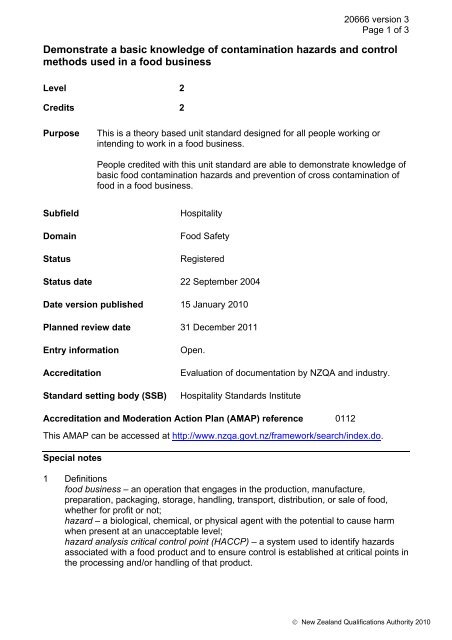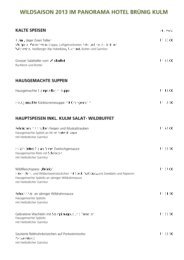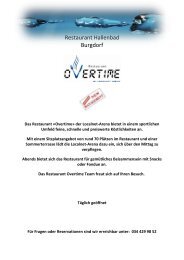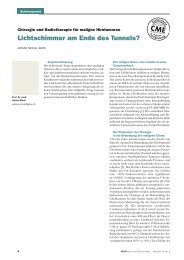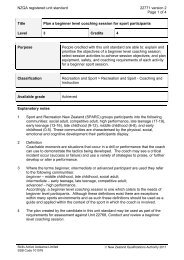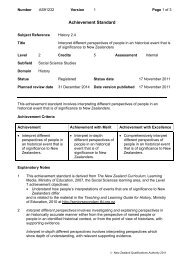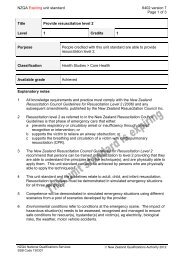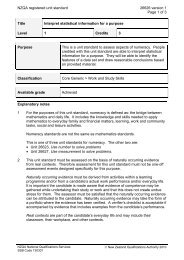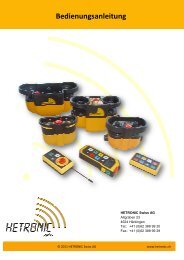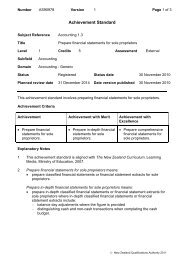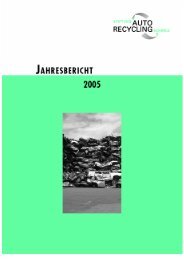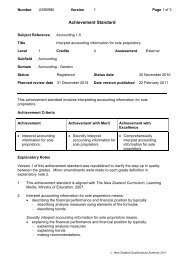20666 - NZQA
20666 - NZQA
20666 - NZQA
You also want an ePaper? Increase the reach of your titles
YUMPU automatically turns print PDFs into web optimized ePapers that Google loves.
<strong>20666</strong> version 3<br />
Page 1 of 3<br />
Demonstrate a basic knowledge of contamination hazards and control<br />
methods used in a food business<br />
Level 2<br />
Credits 2<br />
Purpose<br />
This is a theory based unit standard designed for all people working or<br />
intending to work in a food business.<br />
People credited with this unit standard are able to demonstrate knowledge of<br />
basic food contamination hazards and prevention of cross contamination of<br />
food in a food business.<br />
Subfield<br />
Domain<br />
Status<br />
Hospitality<br />
Food Safety<br />
Registered<br />
Status date 22 September 2004<br />
Date version published 15 January 2010<br />
Planned review date 31 December 2011<br />
Entry information<br />
Accreditation<br />
Standard setting body (SSB)<br />
Open.<br />
Evaluation of documentation by <strong>NZQA</strong> and industry.<br />
Hospitality Standards Institute<br />
Accreditation and Moderation Action Plan (AMAP) reference 0112<br />
This AMAP can be accessed at http://www.nzqa.govt.nz/framework/search/index.do.<br />
Special notes<br />
1 Definitions<br />
food business – an operation that engages in the production, manufacture,<br />
preparation, packaging, storage, handling, transport, distribution, or sale of food,<br />
whether for profit or not;<br />
hazard – a biological, chemical, or physical agent with the potential to cause harm<br />
when present at an unacceptable level;<br />
hazard analysis critical control point (HACCP) – a system used to identify hazards<br />
associated with a food product and to ensure control is established at critical points in<br />
the processing and/or handling of that product.<br />
© New Zealand Qualifications Authority 2010
<strong>20666</strong> version 3<br />
Page 2 of 3<br />
2 Legislation that can be used as references for this unit standard include but are not<br />
limited to Food Hygiene Regulations 1974, Food Act 1981 and any food safety<br />
programmes recognised by this Act, Health and Safety in Employment Act 1992, and<br />
any subsequent amendments.<br />
Elements and performance criteria<br />
Element 1<br />
Demonstrate knowledge of basic food contamination hazards in a food business.<br />
Performance criteria<br />
1.1 Characteristics of bacteria, mould, and yeasts are identified and explained in<br />
relation to the conditions required for their growth.<br />
Range<br />
characteristics – rate of growth, spores, toxins;<br />
conditions – time, temperature, food type, moisture, pH levels,<br />
requirements for oxygen.<br />
Element 2<br />
Demonstrate knowledge of prevention of cross contamination of food in a food business.<br />
Performance criteria<br />
2.1 Methods used to prevent cross contamination of food are identified in terms of<br />
the source of contamination and means of spread.<br />
Range<br />
methods – personal hygiene standards, handling procedures,<br />
cleaning and sanitising procedures, procedures for pest control,<br />
procedures for waste management, storage practice.<br />
2.2 Methods to prevent contamination by killing and controlling micro-organisms are<br />
identified.<br />
2.3 The HACCP system and its relevance to the production of food are explained.<br />
Please note<br />
Providers must be accredited by <strong>NZQA</strong>, or an inter-institutional body with delegated<br />
authority for quality assurance, before they can report credits from assessment against<br />
unit standards or deliver courses of study leading to that assessment.<br />
Industry Training Organisations must be accredited by <strong>NZQA</strong> before they can register<br />
credits from assessment against unit standards.<br />
Accredited providers and Industry Training Organisations assessing against unit standards<br />
must engage with the moderation system that applies to those standards.<br />
© New Zealand Qualifications Authority 2010
<strong>20666</strong> version 3<br />
Page 3 of 3<br />
Accreditation requirements and an outline of the moderation system that applies to this<br />
standard are outlined in the Accreditation and Moderation Action Plan (AMAP). The<br />
AMAP also includes useful information about special requirements for organisations<br />
wishing to develop education and training programmes, such as minimum qualifications for<br />
tutors and assessors, and special resource requirements.<br />
Comments on this unit standard<br />
Please contact the Hospitality Standards Institute information@hsi.co.nz if you wish to<br />
suggest changes to the content of this unit standard.<br />
© New Zealand Qualifications Authority 2010


